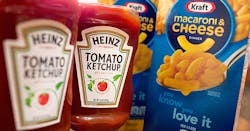Boom in Food M&A Deals Just Getting Started as Kraft Looms
The U.S. food industry has announced $42 billion in deals this year, but it could just be a taste of the next wave of consolidation coming in 2018.
Companies from Kraft Heinz to Conagra are seen as possible suitors next year as food giants struggle to generate growth. They face an array of challenges: shifting eating tastes, a resurgent Wal-Mart playing tough with suppliers and Amazon’s expansion into the grocery business.
The latest round of deal speculation was sparked by two food-industry acquisitions announced Monday. Campbell Soup Co. agreed to acquire Snyder’s-Lance Inc., a maker of potato chips and pretzels, and Hershey Co. will buy Amplify Snack Brands, best known for SkinnyPop popcorn.
With those two transactions, the total value of food deals announced in the U.S. this year increased by about 54 percent from 2016’s $27.1 billion.
Acquisitions are increasingly seen as a way for old-line food companies to tap into new consumer trends -- such as more fresh food. The industry needs something. Campbell’s shares have slumped 18 percent this year while Kellogg’s have dropped 11 percent. Even Kraft Heinz, run by managers from the private equity firm 3G Capital, is down 9 percent in 2017 as investors worry about the company’s ability to pull off another deal.
Much of those losses have been driven by the broad sales slowdown across the industry. Over the last three years, the 10 largest U.S. packaged food companies have seen about $17 billion in sales evaporate. That comes as consumer gravitate to more natural products and as a grocery industry price war prompts food retailers to invest in private label products to appeal to value-conscious shoppers.
“I fully expect this to continue next year,” said Ken Shea, analyst at Bloomberg Intelligence. “It’s a tug of war and the retailers have gotten the upper hand recently -- one way to get that leverage back is to consolidate.”
What’s next? Several possible deals keep coming up in interviews with industry observers and in Wall Street reports. Here’s a breakdown.
Kraft Heinz
Now more than two years removed from the blockbuster merger that created the company, Kraft Heinz is expected to get back into the fray after its $143 billion bid for Unilever was rejected earlier this year.
Mondelez, Campbell, General Mills and Kellogg have been frequently mentioned as potential targets. Kraft Heinz could also look beyond food to a company like Colgate, with a portfolio of household brands and a large presence outside of North America.
The pressure to do a deal is building as Kraft Heinz managers, who hail from the private equity firm 3G Capital, are nearing completion of its cost-cutting program.
Nestle
Facing activist pressure, Nestle is trying to sell its U.S. candy business, as its new CEO focuses the company on faster-growing health care and coffee businesses. Hershey had been considered a potential suitor for the unit, people familiar with the matter told Bloomberg in September.
The confection unit produces Baby Ruth, Butterfinger and other brands. Candy sales are sluggish as U.S. consumers try to cut back on sugar, and trade up to premium chocolate when they’re looking for a sweet snack.
Nestle is hoping to announce the sale by the end of this year and analysts have estimated the operation could fetch $1 billion to $3 billion.
Hain Celestial
Nestle, in turn, has been mentioned as a possible suitor for Hain Celestial Group Inc., a maker of tea, chips and beauty products that has long been considered a target. An accounting probe had cast a pall over the company, but that is largely behind it now.
Activist investor Engaged Capital announced a stake in Hain earlier year, and is pushing for the company to potentially explore a sale. Hain produces the kind of non-GMO and organic snacks that are trendy, but the company’s diverse operations, spanning everything from shampoo to kale juice and vegetable chips, could make a deal tricky, Shea said.
Hain shares gained as much as 2.3% to $41.59 on Tuesday after a report from Maxim Group said the company could be worth $55-$60 a share.
Conagra
Chicago-based Conagra, which owns Orville Redenbacher popcorn, Healthy Choice and Hebrew National hot dogs, has spent the past few years trying to reinvent its image to meet modern tastes under Chief Executive Officer Sean Connolly. The company in September announced an agreement to buy Angie’s Artisan Treats, the maker of Boom Chicka Pop popcorn.
One persistent industry rumor has Conagra going after Pinnacle Foods, which owns Birsdeye frozen vegetables and a handful of faster-growing frozen brands including Udi’s and Evol.
By Craig Giammona
About the Author
Bloomberg
Licensed content from Bloomberg, copyright 2016.
